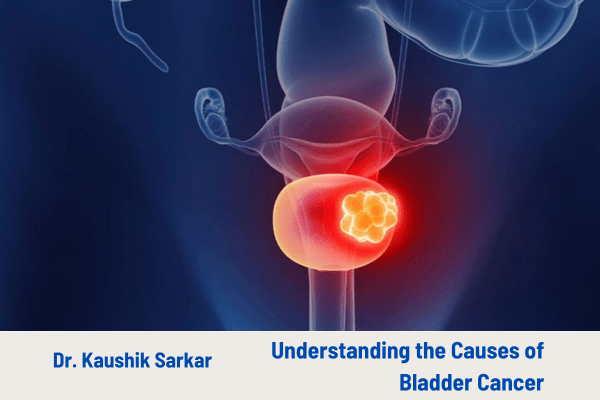Introduction:
Bladder cancer is a serious condition that affects thousands of individuals worldwide. Understanding the causes and risk factors associated with this disease is essential for early detection, prevention, and effective management. In this blog, Dr. Kaushik Sarkar, one of the Best Urologist in Kolkata, sheds light on the causes of bladder cancer. Let’s explore the various factors that contribute to the development of this condition and gain valuable insights from a trusted expert in urology.
Smoking and Tobacco Use:
Smoking is the most significant risk factor for bladder cancer. The harmful chemicals in tobacco smoke enter the bloodstream and are filtered by the kidneys, ultimately reaching the bladder. These chemicals can damage the lining of the bladder, increasing the risk of cancer development. Quitting smoking can significantly reduce the risk of bladder cancer.
Occupational and Environmental Exposures:
Certain occupations and environmental exposures can increase the risk of bladder cancer. Individuals working in industries such as chemical manufacturing, painting, printing, and rubber manufacturing may be exposed to carcinogens, such as aromatic amines and polycyclic aromatic hydrocarbons (PAHs), which are linked to bladder cancer. Additionally, long-term exposure to chemicals in drinking water, such as arsenic, has been associated with an increased risk.
Age and Gender:
Bladder cancer occurs more frequently in older adults, with the risk increasing significantly after the age of 55. Men are also at a higher risk compared to women, although the gap is narrowing. Hormonal differences and varying exposure patterns may contribute to these gender differences.
Chronic Bladder Inflammation and Infections:
Chronic bladder inflammation and recurrent urinary tract infections (UTIs) can increase the risk of bladder cancer. Conditions such as bladder stones, urinary catheter use, and chronic bladder irritation may lead to inflammation and damage to the bladder lining, potentially leading to the development of cancer cells over time.
Genetic Factors:
Genetic predisposition can play a role in bladder cancer development. Some individuals may inherit certain gene mutations that increase their susceptibility to developing this disease. Genetic counseling and testing may be recommended for individuals with a family history of bladder cancer or other related cancers.
Radiation and Chemotherapy:
Previous radiation or chemotherapy treatments for other cancers, particularly in the pelvic area, may increase the risk of bladder cancer later in life. These treatments can damage healthy cells in the bladder, leading to genetic changes and an increased risk of cancer development.
Conclusion:
While the exact causes of bladder cancer are not always clear, several factors contribute to its development. Understanding these risk factors can help individuals make informed decisions about their lifestyle choices, occupational exposures, and overall health. Regular check-ups, early detection, and adopting a healthy lifestyle can significantly reduce the risk of bladder cancer. If you have concerns or are at a higher risk due to any of these factors, consult with a experienced urologist like Dr. Kaushik Sarkar in Kolkata for appropriate screenings and personalized guidance.

